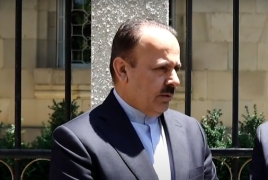
Iran’s deputy ambassador Bahram Tahiri told reporters that, based on their information, a ceasefire has been in place since the morning of June 24 and “is generally being maintained.” He said Iran was forced into the 12‑day conflict, but the unity of its people, armed forces and institutions delivered a worthy defense that compelled the enemy to accept the ceasefire.
The ambassador emphasized Iran will uphold the ceasefire “as long as the enemy remains committed to it.” “However, should any further hostile action be taken against Iran, I can assure you our response will be even more painful,” he warned.
When asked whether Iran might emerge weakened from the conflict, Tahiri firmly rejected that possibility: “No, it’s impossible. In Iran today, solidarity and unity are stronger than ever, and our will to defend our homeland is higher than before. There is no weakness, no soft spot, either among our people or within our governmental system.”
He added: “If there had been any weakness, they would have continued their actions; our strength forced them to reach this conclusion that a ceasefire was necessary.”
Tahiri assessed that the adversary failed to achieve its objectives: “They intended to threaten and endanger the existence of our country. These objectives were not realized.”
On the night of June 22, U.S. President Donald Trump reported successful strikes on three Iranian nuclear facilities — Fordow, Natanz and Isfahan — later claiming complete destruction and describing the operation as a significant military success. Since June 13, Israel had been carrying out daily airstrikes on Iranian territory targeting the Islamic Republic’s missile and nuclear programs.

